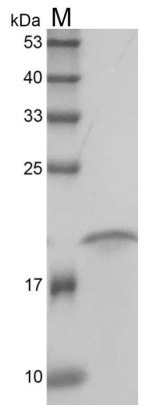| Product name | Human sRANKL protein |
| Sequence | Amino acid sequence derived from Human sRANKL (O14788) (Glu143-Asp317) was expressed. |
| Activity | Immobilized human sRANKL protein at 1μg/mL(100μl/well)can bind Human OPG(C-Fc), The EC50 of Human OPG is 188ng/mL. |
| Protein length | The recombinant human sRANKL consists of 175 amino acids and migrates with an apparent molecular mass of 19 kDa as estimated in SDS-PAGE under reducing conditions. |
| Preparation method | E. coli |
| Purity | ≥ 98 % as determined by SDS-PAGE |
| Alternative | soluble Receptor Activator of NF-κB Ligand, TNFSF11, TRANCE (TNF-related activation-induced cytokine), OPGL, ODF (Osteoclast differentiation factor) |
| Formulation | Lyophilized from sterile 20 mM Tris, 150 mM NaCl pH 8.0. |
| Molecular weight | 19 kDa |
| Usage notes | Always centrifuge tubes before opening . It is recommended to centrifuge at 12000 rpm for 1 minute.Then reconstitute the lyophilized Human sRANKL protein using the buffer we provided not less than 100µg/ml, which can then be further diluted to other aqueous solutions. |
| Storage instructions | Lyophilized Human sRANKL proteinshould be stored desiccated below -20°C. Upon reconstitution, the protein should be stored at 4°C between 2-7 days and for future use below -20°C. For long term storage it is recommended to add a carrier protein (0.132% HSA or BSA). Please prevent freeze-thaw cycles. |
| Shipping | Gel pack with blue ice. |
| Precautions | The product listed herein is for research use only and is not intended for use in human or clinical diagnosis. Suggested applications of our products are not recommendations to use our products in violation of any patent or as a license. We cannot be responsible for patent infringements or other violations that may occur with the use of this product. |
| Background | Tumor necrosis factor ligand superfamily member 11, also known as Receptor activator of nuclear factor kappa-B ligand, Osteoprotegerin ligand, TNFSF11, RANKL, TRANCE, OPGL and CD254, is expressed in a variety of cells, including osteoblasts, fibroblasts, activated T-cells and bone marrow stromal cells, is also capable of interacting with a decoy receptor called OPG. TNFSF11 is involved in a number of fundamental biological processes such as acting as regulator of interactions between T-cells and dendritic cells, the regulation of the T-cell-dependent immune response and enhancing bone-resorption in humoral hypercalcemia of malignancy. It augments the ability of dendritic cells to stimulate naive T-cell proliferation. |
| Gene ID | 8600 |
| Alternative | soluble Receptor Activator of NF-κB Ligand, TNFSF11, TRANCE (TNF-related activation-induced cytokine), OPGL, ODF (Osteoclast differentiation factor) |
| Accession | O14788 |

Fig. SDS-PAGE analysis of Human sRANKL protein.
You must be logged in to post a review.
Reviews
There are no reviews yet.